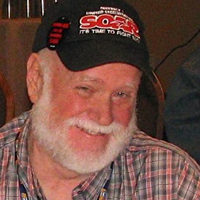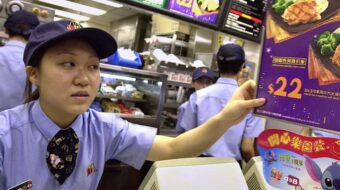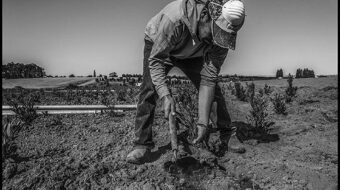
My grandfather was a chicken farmer in Marion, South Carolina. That doesn’t give me any particular expertise on the current egg crisis. But I do remember helping out as a kid and I do have some good chicken stories.
Nowadays my grandfather would be classed as a “free range” farmer. He had two small sheds right out behind his house where the chickens had a pretty big field to roam around. He taught my brother and me how to gather the eggs without getting pecked and how to spread the chicken feed around the area for them. We also got to help change the straw and clean out the sheds. And we learned about roosters. Great fun when you’re 10 years old.
Eventually, in the 1960s, he and a lot of other small chicken farmers in Marion got run out of the business by what was then Ralston Purina. That’s how he explained it to us at the time. I suspect monopoly control of the chicken feed and baby chick businesses had a lot to do with it. Finally grandpa had to take a job at Ralston Purina as a maintenance man at one of their granaries.
I was inspired to write this by Phil Amadon’s great People’s World article, “Factory farms produce more than eggs.” Both his experience and my own made me remember a recent conversation I had with a dear friend of mine, Mark Brody, a veterinarian who treats large animals. I started a rant about “big, industrial farms.” Mark, who has much experience in the world of dairy farms in particular, called me out on a couple of my assumptions.
Like many, I’ve had a kinda “Modern Times” for animals view of large farms. You know, the Charlie Chaplin film about sweatshop factory life. Mark pointed out that many large “factory” dairy farms are family owned and operated.
Furthermore, two factors have meant serious attention to animal welfare and comfort in some of the largest dairy farms. One is that comfortable, healthy cows, with plenty of room to roam, give more and better milk. Second, there is a growing awareness in farming (including in corporate farming circles) of consumer scrutiny and concern about animal health and food safety issues.
None of this means that large farms will embrace the best practices for food safety or animal health and welfare. But it does show that there is a basis for grassroots movements for greater regulation and attention to problems with industrial-size farms.
Here is the big question raised in my mind from our discussion: Given the need to feed a growing world population, what kind of farming is viable and sustainable today? Surely we cannot turn back the clock to an age of small or medium family farms – though those should be protected and supported.
I think it’s clear that there is a difference between corporate farms and family farms no matter how large. It’s also clear that strict regulation and greater attention to animal welfare and food safety are paramount. And there is the obvious need to promote the labor rights and health and safety of farmworkers, including expanding labor law to cover all aspects of farm labor.
As Mark pointed out, the largest family farms, and even some corporate farms, are hurt by the giant food processing monopolies’ price fixing and control.
I wonder where my grandfather would be on these issues if he were alive today. He was a “show me” kind of conservative, but open minded. He cared about his chickens and other farm animals and he cared about his customers. He even recognized that small family farms were losing their dominance in agriculture. And, to be sure, he was no friend of Ralston Purina.
I gotta believe that, feisty guy that he was, he’d be trying to find out how to organize without getting pecked by the monopolies.
Photo: http://www.flickr.com/photos/helloeveryone123/3979113928/ cc 2.0












Comments